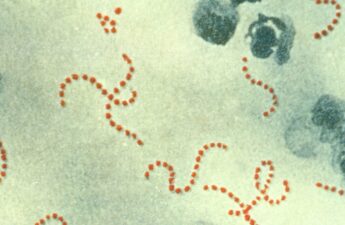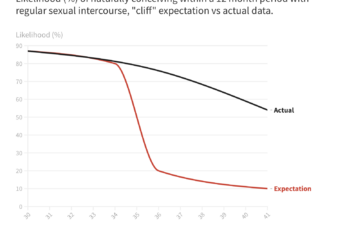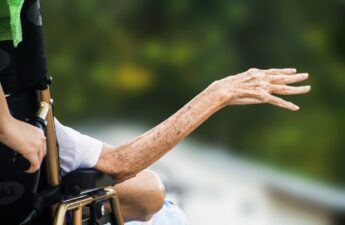Given the low level of immunity in China, a major surge would likely see large numbers of hospitalisations and might lead to a dramatic death toll. If we assume, say, 70% of the Chinese population becomes infected over the coming months, then if 0.1% of those infected die (a conservative estimate ), a back-of-the-envelope calculation suggests we’d see around one million deaths.
Strep A: three doctors explain what you need to look out for
Group A streptococcus is a type of bacteria that can live in the back of the throat or on the skin, especially in children. It can spread between people through close contact or coughing and sneezing. In most people, it either causes no illness or only mild throat or skin infections or scarlet fever. Children with scarlet fever have a sandpaper-like rash over their body, often with fever and sore throat and a “strawberry tongue” – where the tongue is red with a white covering.
Pandoravirus: the melting Arctic is releasing ancient germs – how worried should we be?
All the viruses cultured so far are far from viruses that affect mammals, let alone, humans and would be very unlikely to pose a danger to humans. A more relevant area of concern is that as the permafrost thaws it could release the bodies of long-dead people who might have died of an infectious disease and so release that infection back into the world.
More than 4 in 5 pregnancy-related deaths are preventable in the US, and mental health is the leading cause
Mental health conditions are the overall most frequent cause of pregnancy-related death. Approximately 23% of deaths are attributed to suicide, substance use disorder or are otherwise associated with a mental health condition.
The ethics of brain-computer interfaces lag behind the science, write a philosopher and a neurosurgeon from UW.
Researchers are exploring nonmedical brain-computer interface applications in many fields, including gaming, virtual reality, artistic performance, warfare and air traffic control.
Women are often told their fertility ‘falls off a cliff’ at 35, but is that right?
It’s a fact women’s fertility declines as they age. But the common description of fertility decline after age 35 as a “cliff” is more anxiety-provoking than factual.
Cannabis is no better than a placebo for treating pain – new research
Although cannabis (and cannabis-derived products, such as CBD) may be widely used for reducing pain, how effective it really is in doing this is still unclear. This is what our recent systematic review and meta-analysis sought to uncover. Our study, published in the Journal of the American Medical Association, suggests cannabis is no better at relieving pain than a placebo.
Sexually active women 45 and under who have not been tested for syphilis since Jan. 2021 should be tested, say King County health officials
There has been a nearly 5-fold increase in syphilis in cisgender women since 2015
Scientists Debate the Role of a Virus in Multiple Sclerosis
A recent study offers the strongest evidence yet of the link between Epstein-Barr virus and MS. Not everyone is convinced. By Elizabeth PrestonUndark Magazine Ryan Grant was in his 20s and serving in the military when he learned that the…
Supreme Court Case Could Curtail Rights of Medicaid Patients
Twenty-two Republican-leaning states have urged the Supreme Court to block beneficiaries of federal safety net programs from suing. If the court agrees participants in many federal entitlement programs could lose the right to go to court when they believe a state, city or county has violated their rights in the administration of those programs.
Endgame: How the Visionary Hospice Movement Became a For-Profit Hustle
It might be counterintuitive to run an enterprise that is wholly dependent on clients who aren’t long for this world, but companies in the hospice business can expect some of the biggest returns for the least amount of effort of any sector in American health care. Medicare pays providers a set rate per patient per day, regardless of how much help they deliver. Since most hospice care takes place at home and nurses aren’t required to visit more than twice a month, it’s not difficult to keep overhead low and to outsource the bulk of the labor to unpaid family members — assuming that willing family members are at hand.
King County reports first child flu death of the 2022-2023 flu season
This death comes on top of a steep and unprecedented rise in illnesses and hospitalizations in King County and nationally among children for infections caused by multiple respiratory viruses.
Free at-home COVID-19 tests available in Washington state through the end of the year
Washington State Department of Health (DOH) will continue to provide free COVID-19 home test kits to residents at least through the end of 2022, despite the end of federal financial support for testing programs. Washingtonians can order up to 10 free at-home test kits per month through the “Say Yes! COVID Test” program.
What is ethical animal research? A scientist and veterinarian explain
Federal research agencies follow guiding principles in evaluating the use and care of animals in research.These principles are summarized by the “3 R’s” of animal research: reduction, refinement and replacement. The 3 R’s encourage scientists to develop new techniques that allow them to replace animals with appropriate alternatives.
Weight loss treatments are not a permanent fix – that doesn’t mean they ‘don’t work’
It is often said that 95% of weight-loss measures don’t work. Only, it’s not true. Advances in behavioural treatments (such as cognitive behavioural therapy) for obesity and weight-loss drugs mean there are lots of approaches that help people lose weight. In fact, weight loss is the easy part . The problem is that when you come off a diet or stop taking a weight-loss drug, the weight will invariably creep back up.














